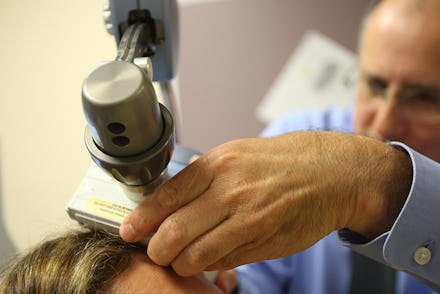Brain Stimulation Could Be an Unexpected Treatment for Anorexia

British researchers think they can electro-pulse the anorexia right out of you.
A new study from King's College London looks at people who have anorexia nervosa, a potentially life-threatening disorder wherein people restrict their food consumption in an effort to control their body weight. According to the report, those symptoms were reduced after a single session of a non-invasive brain stimulation technique called repetitive transcranial magnetic stimulation, a method currently used to treat depression.
By using an electromagnet, physicians create a steady, low-energy electromagnetic pulse thought to lock in longer-lasting changes in the brain — without the physiological challenge of electroconvulsive therapy, which, comparatively, beats the crap out of you with electricity. People who participate in rTMS are awake while receiving treatment, while people undergoing electroconvulsive therapy must be sedated.
"With rTMS we targeted the dorsolateral prefrontal cortex, an area of the brain thought to be involved in some of the self-regulation difficulties associated with anorexia," said Jessica McClelland, a post-doctoral researcher at King's College London and one of the study's authors, in a press release. "This technique alters neural activity by delivering magnetic pulses to specific regions of the brain, which feels like a gentle tapping sensation on the side of the head."
From that session, the study claims participants were less interested in cutting off their food intake, and weren't feeling "full" or "fat." And when presented with the option to either take a fixed amount of money immediately or more money doled out over time, showing how cognitive and impulse control had changed after treatment, they made what the study considered a more prudent decision by taking the larger sum over time.
"Taken together, these findings suggest that brain stimulation may reduce symptoms of anorexia by improving cognitive control over compulsive features of the disorder," McClelland said.
The study only looked at 49 participants, hardly enough to be wholly conclusive. But the theory makes sense. According to the National Association of Anorexia Nervosa and Associated Disorders, almost half of people with eating disorders also meet the criteria for depression, so it shouldn't be surprising that using the depression therapy rTMS for anorexia could be hitting two birds with one electromagnetic stone.